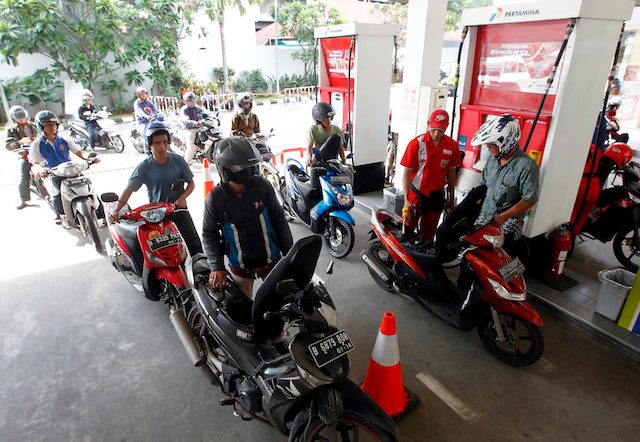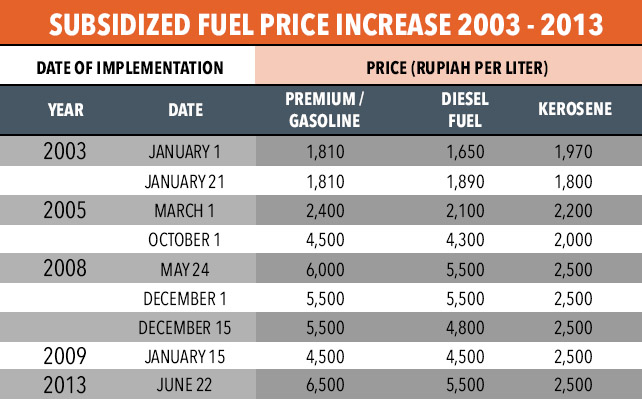SUMMARY
This is AI generated summarization, which may have errors. For context, always refer to the full article.

JAKARTA, Indonesia (3rd UPDATE) – After weeks of speculation, President Joko Widodo finally announced on Monday, November 17, the much-anticipated subsidized fuel price increases.
Effective midnight on November 18 – less than 3 hours after the televised announcement – subsidized gasoline prices will increase from IDR6,500 per liter ($0.53) to IDR8,500 per liter, representing a 31% hike. Diesel prices will increase from IDR5,500 per liter to IDR7,500. Kerosene prices are unchanged at IDR2,500.
“From time to time, a nation faces difficult choices – nevertheless, we must take a decision,” Jokowi said.
The price hike for gasoline, or Premium as it is called in Indonesia, was lower than the IDR3,000 per liter expected as crude prices have fallen below $80 a barrel for the first time in 4 years.
Related stories:
Jokowi has long been expected to raise petrol prices and cut fuel subsidies, which he said during his speech at the APEC CEO Summit would cost the country $27 billion of its $167 billion state budget in 2015. (FULL SPEECH: Jokowi at APEC CEO Summit 2014)
With the price hike, the budget deficit is expected to come in below 2.2% for the year, according to government ministers.
The fuel subsidy is a hot political issue in Indonesia, and price hikes over the past decade have always been met with protests. Jokowi’s own party, the Indonesian Democratic Party of Struggle (PDI-P), has often opposed such price hikes.
But reducing the unsustainable subsidies are seen as vital, with Jokowi himself saying the money can be put to better use.
“We want to channel our fuel subsidy from consumption to the productive activities. From consumptive activities to productive activities. We want to channel our fuel subsidy to the farm for seeds, for fertilizers, and also for irrigation. And we want to build dams – 25 dams in 5 years from our fuel subsidy to maintain the water supply to the farming area,” Jokowi said on November 10.
The so-called people’s president has also said he doesn’t care about the impact of the move on his popularity.
“Some say I will become unpopular (if I raise subsidized fuel prices). I told them that I did not become a leader to seek popularity,” Jokowi said in Yogyakarta on November 6.
The subsidies have also been criticized as being poorly targeted, as the middle class is seen to benefit more from them.
Reactions
Analysts hailed Jokowi’s move, as it fulfilled a campaign pledge to cut the payouts in order to divert money to reforms, such as overhauling infrastructure and helping the country’s poorest.
“The move is encouraging since it suggests that Jokowi is serious about economic reform in Indonesia, and is even prepared to take steps that may prove unpopular in the short-run,” said Gareth Leather, Asia economist from Capital Economics.
But Fadli Zon, a deputy speaker of the House of Representatives from the opposition Gerindra party, questioned the timing of the increase.
“China has reduced fuel prices 7 times since June. The US too. Malaysia today reduced fuel prices. So why is Indonesia increasing its fuel prices?” he said in a tweet.
Within minutes of the announcement, almost all state-owned Pertamina gas stations throughout the country had long lines of motorists – mostly motorcycles – desperate to buy the last of the cheap fuel.
@info_surabaya suasana pom bensin dharma husada pic.twitter.com/va15zTenCa
— chaaaaa !!!!! (@chaakezz) November 17, 2014
Before the announcement, several hundred protesters demonstrated in the city of Makassar, a traditional protest hotspot, in Central Sulawesi, hurling stones at security forces, and there was a small protest in Surabaya city, on Java, AFP reporters said. However, the demonstrations were small compared to the mass protests that have accompanied past fuel price hikes.
In the weeks leading up to the announcement, the prices of some basic commodities were also reported to have begun increasing.
The government expects inflation for the year to increase by 2 percentage points from a baseline of 5.3% as a result of the price hike.
Easing the impact
Coordinating Minister for Economics Sofyan Djalil said there will be 15.6 million  poor and near-poor people who will be entitled to compensation or cash assistance.
poor and near-poor people who will be entitled to compensation or cash assistance.
“Hopefully, the impact of raising subsidized fuel prices can be minimized,” he said.
To help ease the impact, the poor will still be able to use old health care cards to reimburse their medical needs.
Social Affairs Minister Khofifah Indar Parawansa also said they can go to the post office to claim compensation in the form of the Social Protection Card (KPS) starting Tuesday until December 2.
Each family will receive ID200,000 monthly over 2 months.
Where will the budget go?
The announcement was preceded by a closed-door meeting among Jokowi’s economic ministers and senior Indonesian media editors, where the plan for how the fuel subsidy budget will be reallocated was shared in a detailed document.
About IDR120 trillion ($9.6 billion) will be reallocated to infrastructure, including irrigation, roads, ports, power plants, and welfare programs, the editors were told.
In the document, the government outlined the infrastructure targets that can be achieved with the budget reallocation, including:
- The development of 2,650 kilometers of new roads, and 1,000 km of new toll roads
- 15 new airports, 20 new charter planes, and new airport developments for cargo planes in 6 locations
- 24 new ports, 26 new cargo ships, and 500 small boats for fishermen
- 3,258 km of railroads in Java, Sumatra, Sulawesi, and Kalimantan – 2,159 km of intercity railroads and 1,099 km of intracity railroads
- 29 new Bus Rapid Transit (BRT) systems, and build new public transportation in 6 metropolitan and 17 big cities
– with reports from ATA and Agence France-Presse/Rappler.com
Add a comment
How does this make you feel?
There are no comments yet. Add your comment to start the conversation.